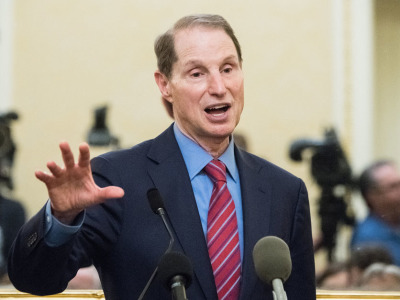Senate Democrats are proposing a tariff on carbon-intensive imports that critics say could increase farm production costs and invite retaliation by countries that would see the tax as unfairly protectionist.
The “border adjustment” is intended to lower greenhouse gas emissions while raising revenue for the $3.5 trillion package of climate measures and domestic spending priorities that Democrats are crafting.
The European Union is proposing a similar border tax of its own, but the EU tariff would serve to offset what is essentially a domestic tax on carbon emissions. Senate Democrats aren’t proposing to tax U.S. emissions, a key difference with the EU plan that experts say could make a U.S. border tariff vulnerable to a World Trade Organization challenge.
For U.S. farmers, a border tariff also could increase the cost of fertilizer, and it would make buildings and equipment more expensive by taxing imported steel and aluminum, said Veronica Nigh, an economist with the American Farm Bureau Federation.
The U.S. is the second-largest importer of anhydrous ammonia, which is derived from natural gas.
Nigh expressed concern that implementing a U.S. border tax could force a later Congress to justify the tariff by either enacting a domestic carbon tax or imposing regulations on U.S. greenhouse gas emissions.
Without such measures, other countries could argue that “we are treating (their) products way worse than our domestic producers, therefore this runs afoul of WTO rules,” Nigh said.
The Biden administration isn’t pushing any regulations on carbon other than a clean electricity standard that would require utilities to reduce emissions.
American consumers also could feel the pinch of a border tax in the form of higher prices for fuel and other goods, potentially violating President Joe Biden’s pledge not to increase taxes on families making less than $400,000 a year. Senate Finance Committee Chairman Ron Wyden said he will be looking at ways to protect consumers from the tariff.

Senate Finance Committee Chair Ron Wyden, D-Ore.
Wyden told Agri-Pulse that the tax is aimed at "ensuring that at a time when we're modernizing our infrastructure and greening our economy that you don't have foreign countries engaging in practices that harm our workers and our manufacturing."
He wouldn't say how he would address the trade concerns. "We're going to look at all of the issues, and I can tell you I'm getting many opinions with respect to what those issues are," he said.
The details of the $3.5 trillion reconciliation bill have not been finalized, but Sen. Chris Coons, D-Del., and Rep. Scott Peters, D-Calif., released a border tax bill Monday that would use the revenue to fund climate resilience projects, transition assistance, and emissions reductions technologies.
Affected products would include “natural gas, petroleum, coal, or any other product derived from natural gas, petroleum, or coal that is used or may be used so as to emit greenhouse gases to the atmosphere,” according to the bill text.
“Despite the leadership of many U.S. businesses in reducing harmful greenhouse gas emissions, they will be left at a disadvantage as trading partners consider levying carbon-related tariffs on certain goods,” according to a summary of the bill.
Brian Flannery, a visiting fellow at Resources for the Future, a think tank that focuses on energy and environmental issues, agreed a U.S. border tariff is likely to trigger retaliation from other countries unless it’s coupled with a domestic carbon tax.
He noted the European Union backed down on extending its domestic carbon tax to imported goods when China threatened to cancel purchases of Airbus jets.
“There are ways those countries can retaliate in the near term” without going through the WTO, he said.
Sen. Chuck Grassley, R-Iowa, said a border tax could push countries such as China and India to address their greenhouse gas emissions, but he also sees potential WTO problems with the proposal. And a domestic carbon tax would face stiff opposition in Congress from “people particularly in agriculture, because we’re so heavy on energy use,” he said.
It’s not yet clear that Democrats can even get the border tariff through the Senate.
Interested in more news on farm programs, trade and rural issues? Sign up for a four-week free trial to Agri-Pulse. You’ll receive our content - absolutely free - during the trial period.
They are planning to move the $3.5 trillion measure through the budget reconciliation process so that they wouldn’t need any Republican support to pass it. However, they couldn’t afford to lose a single Democratic vote, and Joe Manchin, D-W.Va., has expressed reservations about including proposals that attack the use of fossil fuels.
“I'm concerned … about maintaining the energy independence that the United States of America has, and with that, you cannot be moving towards eliminating fossil (fuels),” Manchin said.
The Fertilizer Institute, which represents the fertilizer industry, said in a statement to Agri-Pulse that production of its members' products "is both energy intensive and trade exposed.
“Congress should pay special attention to avoid doing anything that raises the cost of farmer inputs, including fertilizer, that would exacerbate already rising food prices," TFI said. "Additionally, a less competitive U.S. fertilizer industry has the potential to shift production to less efficient producers around the globe, leading to an increase in global emissions rather than a reduction.”
For more news, go to www.Agri-Pulse.com.


